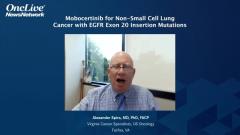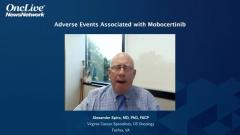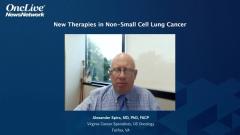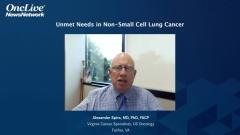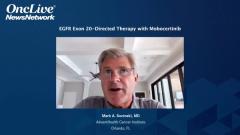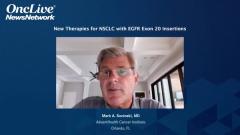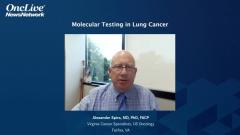
Targeted Therapy for Metastatic Non–small Cell Lung Cancer
Mark A. Socinski, MD shares a brief overview of the biomarkers and FDA-approved targeted therapies for non–small cell lung cancers.
Episodes in this series

Mark A. Socinski, MD: In advanced non–small cell lung cancer, we’ve seen a transformation in the care of these patients, realizing that we have an increasing number of actionable genomic alterations with FDA-approved therapies. The list is up to about 9 different biomarkers for which there are FDA-approved therapies. Some of them are a bit more common, things like EGFR mutations, ALK fusions, BRAF mutations—these sorts of things. Some of them are much less common, like the NTRK fusions and the RET fusions. Interestingly, we’ve had a recent indication for a KRAS G12C drug, which is probably the most common 1 we may see in clinical practice. KRAS has been around for quite a long time, but only recently have we had a targeted therapy associated with it.
What we know about the targeted therapies is that, in general, where they have been studied—this is probably true across all of them—you have a target like a mutation, a fusion, or an amplification, a targeted agent directed at the genomic alteration is much more effective than standard chemotherapy. Many of these genomic subsets are not really getting substantial or differential benefit from immunotherapeutic approaches. It really is the secret of identifying the target and providing them with a targeted therapy that optimizes their chance of a response, progression-free survival, and overall survival advantage. This is why it’s critically important to do comprehensive genomic testing at the time of initial diagnosis. This is where you should be making those decisions.
In my practice, I do both genomic testing on tissue samples where we have a biopsy as well as plasma. We know that we can detect things in plasma that we don’t see in tissue and vice versa. The platform should be broad based in next-generation sequencing [NGS] approaches due to the number of targets we have. But we also have to realize that in the absence of a target, PD-L1 status does have importance in deciding what you’re going to do for these patients. Obviously, PD-L1 testing is done by immunohistochemical approaches, so that’s very different from the NGS platform we’re talking about looking at with these targetable genomic alterations.
TRANSCRIPT EDITED FOR CLARITY


